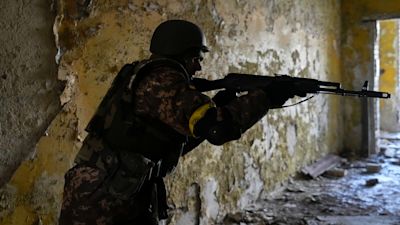Service personnel prohibited from travelling to Ukraine, Ministry of Defence stresses

The Ministry of Defence has said service personnel are banned from travelling to Ukraine amid reports that British soldiers have gone absent without leave to fight against Russia.
The statement followed reports a Coldstream Guardsman is among as many as four missing British soldiers feared to have travelled to Ukraine following the Russian invasion.
ITV News has spoken to two young men (civilians with no military experience) who have left behind their lives in England and travelled to Ukraine to join the fight against Russia, who say they are armed and ready to fight.
When ITV News asked the Foreign Commonwealth and Development Office (FCDO) if Britons - not service personnel - travelling to Ukraine to fight would face prosecution, a spokesperson said: "We advise against travel to Ukraine and anyone who travels to conflict zones to engage in unlawful activity, should expect to be investigated upon their return to the UK.”
However, they did not clarify what would be considered "unlawful activity".
On the question of service personnel specifically, a Ministry of Defence spokesman has said: "All service personnel are prohibited from travelling to Ukraine until further notice.
"This applies whether the service person is on leave or not. Personnel travelling to Ukraine will face disciplinary and administrative consequences." The MoD added it would not comment on specific cases.
Armed and ready to fight: The Brits training for the frontline in Ukraine - watch ITV News UK Editor Paul Brand's report
All travel to Ukraine is banned under official UK military advice.
It states that going to Ukraine to fight, or to assist others engaged in the conflict, may be against the law and could lead to prosecution.
The issue was muddied, however, after Foreign Secretary Liz Truss said she would "absolutely support" British nationals who want to join the fight.
Her comments were then effectively contradicted by Defence Secretary Ben Wallace who urged Britons not to travel to Ukraine to join the fighting as he said the “very dangerous” situation could lead to them being killed.
Downing Street added to that sentiment, as Prime Minister Boris Johnson’s official spokesman said: "We think the best way we can help Ukraine right now is by ensuring Putin fails.
"There are a number of ways Brits can show their support for that, and the Ukrainian embassy in London is putting out information about how British people can support.
"We fully recognise the strength of feeling about British people wanting to support the Ukrainians following the Russian invasion. There’s advice up on travelling to Ukraine, we currently advise against travel to Ukraine."
Another issue is the UK has limited consular support in Ukraine, and is unlikely to be able to offer assistance to anyone in the country.
It is understood that UK defence chiefs are keenly aware of the desire among people back home who want to help the Ukrainians after the Russian invasion, but the only support they can provide is defensive in nature.
The UK is working with its allies to provide a range of support to Ukraine, including to enhance that nation’s defence capability.